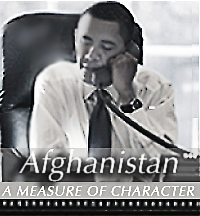
|
Many of us on the right believe that we have known Barack Obama’s ideology for years now. But when he renders his decision on Afghanistan, we will get our first real insight into his character as a President. Let us hope, as patriots, that it provides an occasion to cheer a man with whom we are often at odds.
|
|
| "If we aren't willing to pay a price for our values, if we aren't willing to make some sacrifices in order to realize them, then we should ask ourselves whether we truly believe in them at all." – Barack Obama, "The Audacity of Hope"
"… I want the American people to understand that we have a clear and focused goal: to disrupt, dismantle and defeat al Qaeda in Pakistan and Afghanistan, and to prevent their return to either country in the future. That's the goal that must be achieved. That is a cause that could not be more just. And to the terrorists who oppose us, my message is the same: We will defeat you." – Barack Obama, March 27, 2009
It can rightly be said of President Barack Obama that, like a Chihuahua baring its teeth, his capacity for courage is usually inversely related to its necessity. Throughout the 2008 campaign, he promised a new, confident, straight-spined liberalism. He would eliminate the politics of fear and cynicism; he would at long last chase the special interests out of Washington; He would tell the American people the hard truths that his cynical Washington colleagues glossed over. All this is easy, of course, when one is shadowboxing.
In practice, though, the President has pulled his punches. How did he overcome political fear and cynicism? By setting up a White House e-mail address where citizens could rat out those who criticized the administration’s health care plans. Chase the special interests out of Washington? This White House roots its legislative strategy in getting as many interest groups as possible on board – and with hundreds of billions of dollars in spending kicking around the halls of Congress, they haven’t found the task too difficult. As for hard truths, Obama has only been able to get past standard presidential patter once in his first nine months in the White House. To his credit, however, he was right. Kanye West is a jackass.
This pattern of aggressive promises followed by sheepish or irresolute actions has unfortunate consequences. Not only does it inspire the kind of cynicism that Obama’s time in office was supposed to cure, it also emboldens the President’s enemies. On domestic issues like the stimulus, cap and trade, and health care, that’s simply a matter of stoking partisan fires. But in foreign affairs – where Obama’s enemies and America’s are one and the same (whether he realizes it or not) – that means putting the country in the crosshairs.
Nowhere has this false hope been more evident than in Obama’s approach to Afghanistan. On the campaign trail, Afghanistan was “the good war” – a noble struggle against a clearly defined enemy, prematurely abandoned in favor of oil imperialism in Iraq. In fact, Obama was so hawkish on Central Asia during last year’s election that he even one-upped John McCain, drawing the Arizona Senator’s criticism for pledging to launch attacks inside Pakistan if the nation’s government didn’t act against Al-Qaeda targets.
This seriousness of purpose seemed to carry over into the early days of Obama’s presidency. In March, Obama announced a decisive new strategy for Afghanistan. Less than two months later, he made waves when he boldly dismissed General David McKiernan as the top U.S. commander in Afghanistan and replaced him with General Stanley McChrystal, a Special-Forces officer and acolyte of General David Petraeus. As the kind of clear-eyed strategic shift that had eluded George W. Bush for so long in the pre-Petraeus years in Iraq, it came as a welcome sign for those who wished to see a Democratic Commander-in-Chief forge a modern version of the Cold War Consensus for the War on Terror.
But as the summer yielded to autumn, so too did Obama’s resolve seem to wither. With General McChrystal’s request for 40,000 additional troops to substantiate the counterinsurgency strategy in Afghanistan weighing heavily on the public debate, the President seems hesitant and timid. His Vice President calls for a drawdown, with an emphasis on remote strikes and Special Forces – a repeat of the strategy that brought America to grief in the 1990s. His Secretary of State and Secretary of Defense look prone to endorse a McChrystal-lite strategy, embracing the counterinsurgency approach, but endorsing troop increases far short of the commander’s request. By embracing a new mission without the means necessary to achieve it, this would yield the worst of all possible worlds.
If he hasn’t already, Obama is about to learn the lesson that President Bush learned in 2007, when he launched the surge in Iraq to widespread skepticism and even outright condemnation – much of it from within his own party. The Presidency is truly the loneliest charge in American public life. In matters of life and death, war and peace or prosperity and decline, the burden of the nation’s future weighs heavier on the shoulders of the man in the Oval Office than any other statesmen. And often history hands that man a moment where greatness can only be achieved in the face of the gale-force winds of public opinion and political expediency.
Many of us on the right believe that we have known Barack Obama’s ideology for years now. But when he renders his decision on Afghanistan, we will get our first real insight into his character as a President. Let us hope, as patriots, that it provides an occasion to cheer a man with whom we are often at odds. For on this issue, the fortunes of the Presidency and the nation will rise and fall together.

|


























